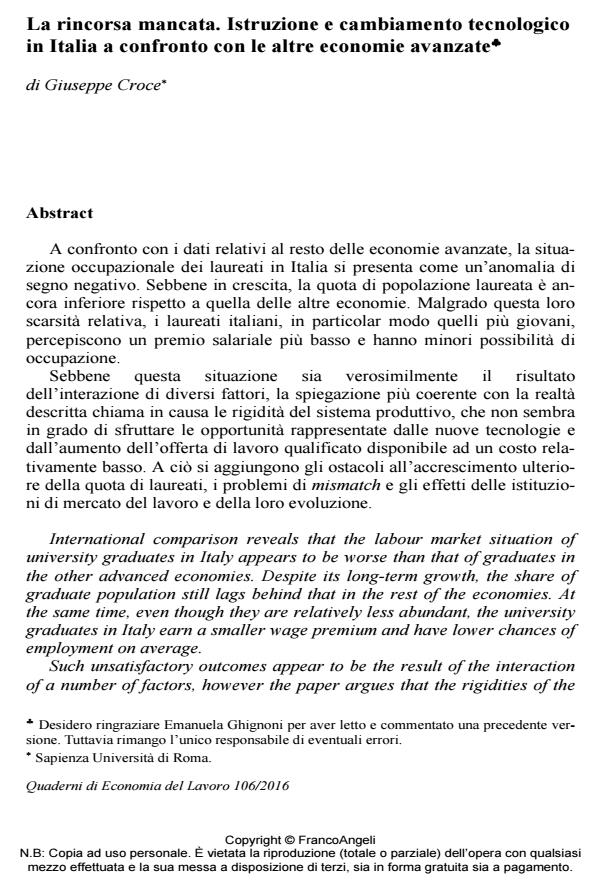La rincorsa mancata. Istruzione e cambiamento tecnologico in Italia a confronto con le altre economie avanzate
Journal title QUADERNI DI ECONOMIA DEL LAVORO
Author/s Giuseppe Croce
Publishing Year 2017 Issue 2016/106
Language Italian Pages 23 P. 77-99 File size 829 KB
DOI 10.3280/QUA2016-106005
DOI is like a bar code for intellectual property: to have more infomation
click here
Below, you can see the article first page
If you want to buy this article in PDF format, you can do it, following the instructions to buy download credits

FrancoAngeli is member of Publishers International Linking Association, Inc (PILA), a not-for-profit association which run the CrossRef service enabling links to and from online scholarly content.
International comparison reveals that the labour market situation of university graduates in Italy appears to be worse than that of graduates in the other advanced economies. Despite its long-term growth, the share of graduate population still lags behind that in the rest of the economies. At the same time, even though they are relatively less abundant, the university graduates in Italy earn a smaller wage premium and have lower chances of employment on average. Such unsatisfactory outcomes appear to be the result of the interaction of a number of factors, however the paper argues that the rigidities of the production system play a prominent role, as firms seem unable to take advantage of the new technologies and of the increase in the supply of qualified and relatively cheap labour. Moreover, things are made worse by obstacles limiting the further growth of the graduate share, mismatch issues in the labour market and some effects of labour institutions
- Acemoglu D. (2002). Technical change, inequality and the labor market. Journal of economic perspectives, XL.
- Autor D.H., Katz L.F., Kearney M.S. (2006). The Polarization of the US Labor Market. American Economic Review Papers and Proceedings, 96.
- Brandolini A., Bugamelli M., a cura di (2009). Rapporto sulle tendenze nel sistema produttivo italiano. Questioni di economia e finanza, 45. Banca d’Italia.
- Bratti M., Checchi D., de Blasio G. (2008). Does the expansion of higher education increase the quality of educational opportunities? Evidence from Italy. Labour, 22.
- Brunello G., Comi S., Lucifora C. (2000). The returns to education in Italy: a new look at the evidence. IZA Discussion paper, 130.
- Capparucci M. (2009). Politiche del lavoro e politiche dei redditi. Modelli teorici e processi di riforma. Quaderni di Economia del lavoro, 88-89.
- Caroleo F.E., Pastore F. (2013). Overeducation at a Glance: Determinants and Wage Effects of the Educational Mismatch, Looking at the AlmaLaurea Data. IZA Discussion paper, 7788.
- Ciccarone G., Saltari E. (2015). Cyclical downturn or structural disease? The decline of the Italian economy in the last twenty years. Journal of Modern Italian Studies, 20(2).
- Croce G. (2012). L’overeducation in Europa e in Italia: dobbiamo prenderla sul serio? Meridiana, Roma: Viella, pp. 71-72..
- Croce G., Ghignoni E. (2012). Demand and supply of skilled labour and overeducation in Europe: a country-level analysis. Comparative Economic Studies, 54.
- Dew-Becker I., Gordon R.J. (2008) The role of labor market changes in the slowdown of European productivity growth. NBER Working Paper, 13840.
- European Commission (2015) Employment and Social Developments in Europe 2014. Bruxelles.
- Frey L., Ghignoni E. (2000) Trasformazioni del sistema formativo e qualificazione dell’offerta di lavoro per generazioni. Quaderni di Economia del lavoro, 67.
- Frey L., Livraghi P. (2001) “Nuova economia” e lavoro a elevato livello di apprendimento. Quaderni di Economia del lavoro, 71.
- Frey L., Livraghi R., Pappadà G. (2003). Lavoro a elevato livello qualitativo e sistemi economici/sociali fondati sulla conoscenza. Quaderni di Economia del lavoro, 76-77.
- Gabriele S., Raitano M. (2008). La trasmissione intergenerazionale dei titoli di studio nell’Unione Europea. Rivista delle politiche sociali, 2.
- Goldin C., Katz L. (2008). The race between educatoin and technology. Harvard: Belknap Press, Harvard University Press.
- Goos M., Manning A., Salomons A. (2009). Job Polarization in Europe. American Economic Review, 99 (2).
- Gordon R.J. (2016). The rise and fall of American growth. Princeton: Princeton University Press.
- Hanushek, E.A. et al. (2013). Returns to Skills Around the World: Evidence from PIAAC. OECD Education Working Papers, 101. OECD Publishing.
- Hendricks L., Schoellman T. (2014). Student abilites during the expansion of US education. Journal of monetary economics, 63.
- OECD (2011). Divided We Stand: Why Inequality Keeps Rising. OECD Publishing.
- OECD (2014). Education at a Glance 2014. OECD Publishing.
- OECD (2015) Education at a Glance 2015. OECD Publishing.
- Olivieri E. (2012). Il cambiamento delle opportunità lavorative. Questioni di economia e finanza, 117. Banca d’Italia.
- Paccagnella, M. (2015). Skills and Wage Inequality: Evidence from PIAAC. OECD Education Working Papers, 114. OECD Publishing.
- Ricci A., Naticchioni P. (2011). L’evoluzione dei rendimenti salariali dell’istruzione. In: Ricci A., a cura di, Istruzione, formazione e mercato del lavoro: i rendimenti del capitale umano in Italia. Roma: ISFOL.
- Rosolia A. e Torrini R. (2007). The generation gap: relative earnings of young and older workers in Italy. Temi di discussione, 639. Banca d’Italia.
- Schivardi F., Torrini R. (2011). Cambiamenti strutturali e capitale umano nel sistema produttivo italiano. Questioni di economia e finanzia, 108. Banca d’Italia.
- Snower D. (1996). The low skill-bad job trap. In: Booth A. e Snower D., a cura di, Acquiring skills. Cambridge: Cambridge University Press.
- Teulings C., Baldwin R. (2014). Secular Stagnation: Facts, Causes, and Cures. London: CEPR Press.
- Tinbergen J. (1975). Income distribution: analysis and policies. Amsterdam: North-Holland Publishing.
- Visco I. (2009). Investire in conoscenza. Bologna: il Mulino.
Giuseppe Croce, La rincorsa mancata. Istruzione e cambiamento tecnologico in Italia a confronto con le altre economie avanzate in "QUADERNI DI ECONOMIA DEL LAVORO" 106/2016, pp 77-99, DOI: 10.3280/QUA2016-106005